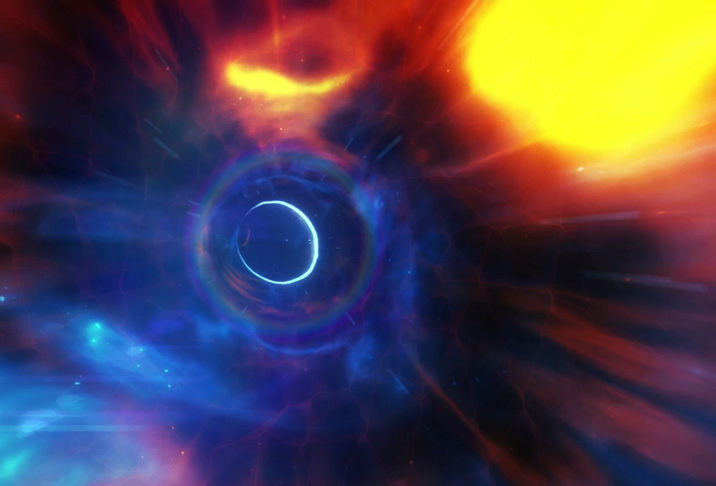Time travel, strange paradoxes, wormholes, and quantum entanglement. Do you ever wish you could go back in time and witness historical events?
Lots of people are fascinated by time travel, including scientists and fans of science fiction. Although we haven’t figured out how to travel through time, new technology and scientific research are giving us some cool ideas. For example, quantum entanglement and wormholes could help us travel through time.
Let’s explore this exciting topic together and see what we can discover about time travel!
Time Travel
Time Travel: Exploring Science Fiction vs Scientific Research

Time travel has captured the imagination of people for generations. It’s a fascinating topic that has been explored in countless works of science fiction, from H.G. Wells’ “The Time Machine” to the more recent “Back to the Future” movie franchise. But time travel isn’t just a subject for science fiction; it’s also a topic of scientific research and speculation. Physicists have long debated the possibility of time travel, and some even believe that it may be possible in the future.
However, time travel is not just a subject for science fiction. It is also a topic of scientific research and speculation. Many physicists have devoted their careers to exploring the possibility of time travel and the physics behind it. Some even believe that time travel could be possible in the future, although it would require technologies or phenomena that are currently not understood or even known to science.
The Challenges of Time Travel
One of the main challenges of time travel is the possibility of paradoxes. Paradoxes are situations that contradict themselves, such as a person traveling back in time and accidentally killing their own ancestor. This would create a paradox that could potentially have disastrous consequences. This is just one of the many theoretical challenges associated with the time space continuum.
Despite these challenges, the concept of time travel continues to captivate the imagination of people around the world. It is a fascinating topic that has inspired many works of science fiction, and it continues to be a source of much speculation and debate among scientists and other thinkers.
Scientific Advancements in Time Travel
In recent years, advancements in technology have made some believe that time travel could be possible in the future. For instance, scientists have already begun to explore the possibilities of using quantum entanglement as a means of time travel. Quantum entanglement is the phenomenon in which two particles become linked in a way that they share the same physical state, regardless of their distance from one another. This could allow for particles to move through time, as the entangled particles would be connected across different points in the timeline.

Other theories suggest that the use of wormholes could also provide a means of traveling through time. A wormhole is a theoretical tunnel-like structure that would connect two distant points in space-time, allowing for a shortcut between two points that would otherwise be too far apart to reach. Scientists believe that if a wormhole were to be constructed, it could provide a method of traveling through time.
Theoretical Challenges of Time Travel
Paradoxes and Their Potential Disastrous Consequences
Time travel has been a popular topic in science fiction and scientific circles for a long time. While the idea of time travel is fascinating, it also comes with some serious consequences. One of these consequences is the possibility of paradoxes, which are situations that contradict themselves.

Paradoxes in time travel occur when someone travels back in time and accidentally changes something that has an effect on the future. For example, if someone went back in time and killed their own ancestor, it would create a paradox. This is because if their ancestor was never born, then the person themselves would never have been born, and therefore could not have gone back in time to kill their ancestor.
The consequences of paradoxes in time travel can be disastrous. They can create alternate timelines, erase important events from history, and cause a ripple effect that changes the course of the future in unexpected ways. This is why time travel is a subject that is taken very seriously by scientists and writers alike.
Regardless, many people remain fascinated by the idea of time travel and the possibilities it could offer. While time travel is still just a concept, the discussion surrounding it will continue to be a source of debate and fascination for years to come.
Other Theoretical Challenges Associated with Time Travel
In addition to the possibility of paradoxes, there are other challenges associated with time travel that scientists and theorists have explored.
One of the main challenges is the issue of causality. This refers to the relationship between cause and effect, and how events in the past can affect the present and future. If transtemporal travel were possible, it could potentially create a causal loop where events in the past are affected by events from the future, and vice versa. This could lead to confusion and make it difficult to determine the true cause of any given event.
Another challenge is the issue of energy requirements. According to the laws of physics, it would require an immense amount of energy to travel through time, and this energy may not be currently available or even possible to generate. Additionally, there are issues related to the nature of time itself, as some theories suggest that time may not actually exist as a separate entity, but rather be an emergent property of space.
Quantum Entanglement
Explanation of Quantum Entanglement
Quantum entanglement is a phenomenon that occurs when two particles become linked in such a way that their properties become intertwined, regardless of the distance between them. This means that the state of one particle will affect the state of the other, no matter how far apart they are. This concept is one of the strangest and most fascinating aspects of quantum mechanics, and it has led to a lot of speculation about its potential uses, including the possibility of time travel.
One of the key characteristics of quantum entanglement is that it is a non-local phenomenon. This means that it occurs instantaneously across space and time, without any apparent physical connection between the particles. It’s as if the two particles are somehow communicating with each other faster than the speed of light, even though this violates Einstein’s theory of relativity. This strange behavior has led to much confusion and debate among scientists, and it is still not fully understood.
Quantum entanglement has been shown to have many practical applications. For example, it has been used to create highly accurate clocks and sensors, and it is being explored as a potential means of secure communication. It is also being investigated as a potential tool for quantum computing, which could revolutionize computing technology by allowing for much faster and more powerful computers. Overall, quantum entanglement is a fascinating and complex phenomenon that has the potential to unlock many secrets of the universe.

Possibility of Using Quantum Entanglement as a Means of Traveling Through Time
This concept of quantum entanglement has fascinated scientists for many years and has recently led some to speculate that it could be used to achieve time travel.
The idea of using quantum entanglement for time travel is based on the fact that particles can be entangled across different points in time. This means that particles that are entangled in the present could be connected to particles in the past or future. If this connection could be maintained, it would be possible to transmit information or even matter between different points in time. This would allow for the possibility of time travel.
The use of quantum entanglement for time travel is still in the realm of theory, and there are many challenges that need to be overcome before it can become a reality. One of the biggest challenges is maintaining the entanglement over a long period of time. Entanglement is a delicate state that can be easily disrupted by outside forces, and maintaining it over a long period of time would require a high degree of precision and control. Despite these challenges, scientists remain fascinated by the possibilities of quantum entanglement, and continue to explore its potential for time travel and other applications.
Current Research and Studies on the Topic of Quantum Entanglement
Several physicists and researchers are currently studying the concept of quantum entanglement as a potential means of time travel. One study conducted by scientists at the University of Queensland explored the possibility of using entangled particles to create a “closed timelike curve,” which would allow for time travel. The researchers concluded that while the concept was mathematically sound, it would require the use of particles that have not yet been discovered.
Another study published in the Journal of High Energy Physics proposed the idea of using entangled black holes as a means of time travel. The researchers suggested that two entangled black holes could be used to create a wormhole, allowing for travel between different points in time. However, the study also acknowledged that the concept would require advanced technology and a better understanding of the nature of black holes.
There are also ongoing experiments and research being conducted on the nature of entanglement itself, with the hope of unlocking its full potential for use in various fields, including time travel. One experiment conducted by researchers at the National Institute of Standards and Technology demonstrated the entanglement of two qubits (quantum bits) separated by a distance of 22 meters. The findings could potentially lead to the development of new technologies that make use of quantum entanglement, including those related to time travel.
While the idea of using quantum entanglement as a means of time travel remains largely theoretical, ongoing research and studies in the field suggest that it may one day be possible. As technology and our understanding of the laws of the universe continue to evolve, scientists will likely continue to explore the possibilities of using quantum entanglement to unlock the secrets of time travel.
Wormholes and Time Travel
Explanation of Wormholes
Wormholes are a fascinating concept that have captured the imagination of science fiction fans and scientists alike. A wormhole, also known as an Einstein-Rosen bridge, is a theoretical passage through space-time that connects two distant points in the universe. They are essentially shortcuts through space-time, allowing travelers to bypass the vast distances between two points.
Wormholes are predicted by Einstein’s theory of general relativity. According to this theory, gravity is not a force between masses, but rather a curvature of space-time caused by the presence of massive objects. Wormholes are thought to exist as a consequence of this curvature, as they are created by the warping of space-time by massive objects such as black holes.
The existence of wormholes has yet to be proven. Scientists are still trying to understand the nature of space-time and gravity, and the search for evidence of wormholes continues. While the idea of traveling through wormholes may seem like something out of science fiction, it is a topic of active research in the scientific community, and who knows what the future may hold.
Possibility of Using Wormholes as a Means to Travel Through Time

The concept of wormholes comes from Einstein’s theory of general relativity, which posits that spacetime can be distorted by massive objects. Wormholes are essentially a hypothetical tunnel through spacetime that could potentially allow for faster-than-light travel and time travel.
The idea of using wormholes for time travel is based on the theory that if one end of a wormhole were to be moved at a high velocity, time would be slowed down for that end relative to the other end.
This would create a time difference between the two ends of the wormhole, effectively allowing for time travel. However, the difficulty lies in actually creating and stabilizing a wormhole. The amount of energy required to stabilize a wormhole is currently beyond our technological capabilities, and even if it were possible, the potential for instability and collapse could be catastrophic.
Researchers continue to explore the potential uses of wormholes in time travel. In recent years, theoretical physicists have proposed the use of exotic matter, a hypothetical form of matter with negative energy density, as a means of stabilizing a wormhole. This would require the creation of exotic matter with properties that have yet to be observed in the universe, making it an area of intense study and research.
Current Research and Studies on the Topic of Wormholes
Recent advancements in the field of astrophysics have reignited interest in the possibility of using wormholes for space and time travel. Wormholes, also known as Einstein-Rosen bridges, are hypothetical structures that connect two separate points in space-time. They were first introduced as a concept in Einstein’s theory of general relativity in 1916.
Theoretical studies have shown that traversable wormholes, which can be used for travel, would require exotic matter with negative energy densities. Although exotic matter has never been observed in nature, scientists have proposed the existence of negative mass particles to fulfill this requirement. However, the possibility of negative mass is still a matter of debate and further research is necessary to determine its feasibility.
Recent studies have also focused on the stability and longevity of wormholes. Wormholes are highly unstable and tend to collapse under the slightest perturbations. However, some theoretical models suggest that the use of advanced technologies, such as quantum entanglement, may help stabilize wormholes and make them more suitable for travel. Researchers are continuing to explore these possibilities through computer simulations and mathematical modeling.
In addition to their potential applications for space and time travel, wormholes have also been the subject of much research in the field of quantum gravity. Scientists are using wormholes to investigate the properties of black holes and to better understand the nature of the universe. As technology advances and our understanding of physics improves, the study of wormholes will likely continue to be a fascinating and important area of research.
Wrapping Up and Final Thoughts
While time travel remains a subject of science fiction, it’s exciting to think about the possibilities of what could happen if it were possible.
The idea of quantum entanglement and wormholes as methods for time travel may sound far-fetched, but so did many scientific advancements in the past. Who knows what discoveries the future holds?
The concept of time travel will always be a fascinating topic that continues to inspire the imagination of people around the world. Until then, we can only dream of the endless possibilities and continue to explore the many theoretical challenges associated with this amazing concept.
Keep dreaming and never stop exploring!
- Visser, M. (1996). Lorentzian Wormholes: From Einstein to Hawking. American Journal of Physics, 64(10), 1275-1276. doi: 10.1119/1.18344
- Morris, M. S., & Thorne, K. S. (1988). Wormholes in spacetime and their use for interstellar travel: A tool for teaching general relativity. American Journal of Physics, 56(5), 395-412. doi: 10.1119/1.15620
- Thorne, K. S. (1994). Wormholes in spacetime and their use for interstellar travel: A movie treatment. arXiv preprint gr-qc/9406079.
- Hawking, S. W. (1992). Chronology protection conjecture. Physical Review D, 46(2), 603. doi: 10.1103/PhysRevD.46.603









